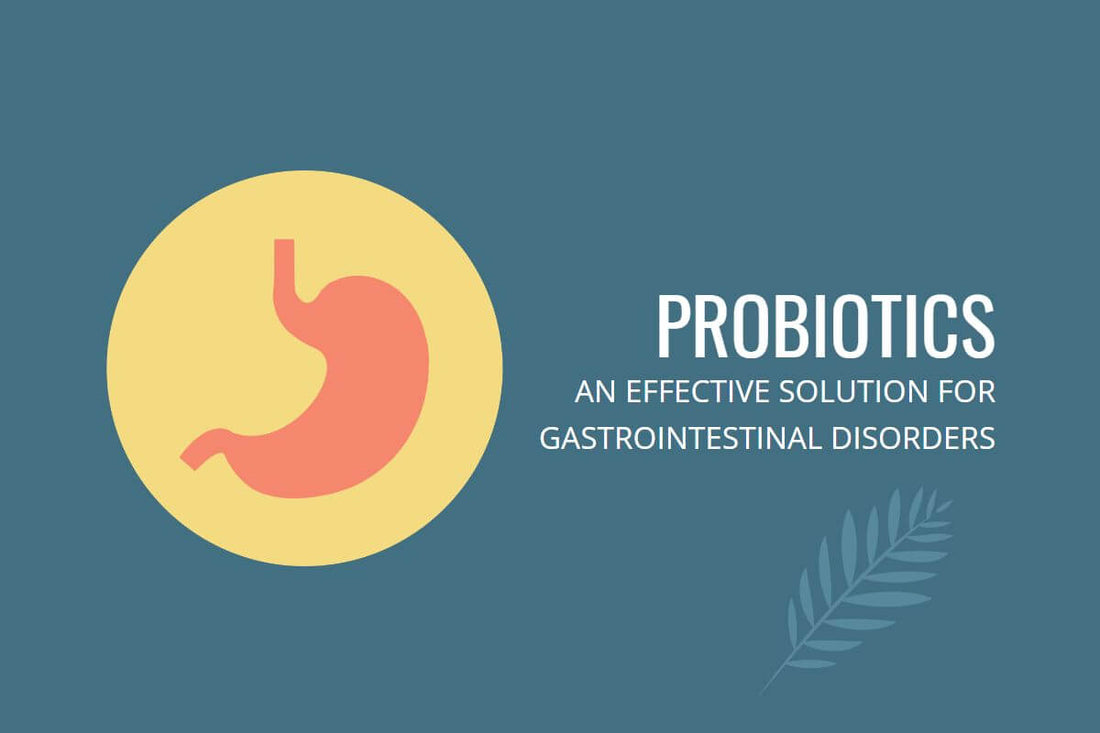
An Effective Solution for Gastrointestinal Disorders: The Benefits of Probiotics and Prebiotics
Share
Gastrointestinal disorders refer to a range of medical conditions that affect the digestive system. Some common gastrointestinal disorders include Irritable Bowel Syndrome (IBS), Inflammatory Bowel Disease (IBD), acid reflux, heartburn, indigestion, constipation, diarrhea, hemorrhoids, anal fissures, Crohn's disease, and managing colitis.
Here's how the combination of Projoy probiotics and prebiotics can help with each of these disorders:
Irritable Bowel Syndrome (IBS) - IBS is a functional bowel disorder characterized by abdominal pain and discomfort, bloating, gas, constipation, and diarrhea. Probiotics, such as those found in Projoy, have been shown to help reduce the symptoms of IBS by improving gut bacteria balance, reducing inflammation, and improving gut motility (Simren et al., 2013).
Inflammatory Bowel Disease (IBD) - IBD is a chronic inflammatory condition that affects the digestive system, including Crohn's disease and ulcerative colitis. Probiotics have been shown to help reduce inflammation, improve gut bacteria balance, and alleviate symptoms of IBD (Kau et al., 2011).
Acid Reflux and Heartburn - Acid reflux and heartburn occur when acid from the stomach flows back into the esophagus. Probiotics, such as those found in Projoy, have been shown to help reduce symptoms of acid reflux and heartburn by improving gut bacteria balance and reducing inflammation (Nagpal et al., 2015).
Indigestion - Indigestion is a common digestive disorder characterized by abdominal pain, bloating, and discomfort after eating. Probiotics, such as those found in Projoy, have been shown to improve gut bacteria balance and digestion, thereby reducing the symptoms of indigestion (O'Mahony et al., 2005).
Constipation - Constipation is a common digestive disorder characterized by difficulty passing stool, or passing stool less than three times a week. Probiotics, such as those found in Projoy, have been shown to improve gut bacteria balance and digestive transit, thereby reducing symptoms of constipation (O'Mahony et al., 2005).
Diarrhea - Diarrhea is a common digestive disorder characterized by frequent, watery stools. Probiotics, such as those found in Projoy, have been shown to improve gut bacteria balance, reduce inflammation, and alleviate symptoms of diarrhea (Kang et al., 2018).
Haemorrhoids - Hemorrhoids are a common condition that affects many individuals, causing discomfort and pain. The combination of probiotics and prebiotics in Projoy can help manage the symptoms of hemorrhoids by improving gut health and regulating bowel movements.
- Probiotics have been shown to have a beneficial impact on digestive health, including the treatment of hemorrhoids.
- Additionally, prebiotics such as fructooligosaccharides and guar gum in the Projoy probiotic may help promote healthy gut bacteria and improve bowel regularity, thus reducing the symptoms of hemorrhoids.
Anal fissures - Some small studies suggest that certain strains of probiotics may help improve gut health and reduce inflammation, which may in turn help with the symptoms of anal fissures. However, more research is needed to fully understand the effects of probiotics on this condition.
Perianal abscesses - Perianal abscesses are usually caused by bacterial infections and are treated with antibiotics and drainage. Probiotics, in general, are beneficial for digestive health and can support a healthy gut microbiome.
Crohn's disease - Crohn's disease is a chronic inflammatory bowel disease that can affect any part of the digestive tract. It is characterized by abdominal pain, diarrhea, weight loss, and malnutrition. Studies have shown that probiotics, including those found in Projoy probiotic, may play a role in managing Crohn's disease.
- Probiotics are beneficial bacteria that help to maintain a healthy balance of microorganisms in the gut. By doing so, they can help to reduce inflammation and improve symptoms of Crohn's disease.
- One study published in the World Journal of Gastroenterology found that supplementation with a specific strain of the bacterium Lactobacillus rhamnosus reduced the symptoms of Crohn's disease, such as abdominal pain and diarrhea, in a significant number of patients.
- Another study published in the Journal of Clinical Gastroenterology found that a mixture of probiotic strains, including Lactobacillus acidophilus and Bifidobacterium bifidum, improved the symptoms of Crohn's disease in a group of patients.
- In addition, probiotics may also help to improve nutrient absorption and reduce the risk of malnutrition, which is a common complication of Crohn's disease.
Managing colitis - Probiotics have shown to play a role in managing colitis, a type of Inflammatory Bowel Disease (IBD). Colitis is characterized by inflammation and swelling of the inner lining of the colon, leading to symptoms such as abdominal pain, diarrhea, and rectal bleeding. Probiotics work by introducing beneficial bacteria into the gut, helping to maintain a healthy gut microbiome, which can improve symptoms of colitis.
- Studies have shown that certain probiotic strains, such as Lactobacillus acidophilus, Bifidobacterium bifidum, and Saccharomyces boulardii, can help reduce inflammation and improve the symptoms of colitis.
- A study published in the Journal of Clinical Gastroenterology found that supplementation with the probiotic strain Lactobacillus plantarum reduced inflammation in patients with ulcerative colitis.
- Projoy probiotic contains a blend of probiotic strains that have been shown to have the potential in improving gut health and reducing inflammation, which may help in managing colitis.
In conclusion, the combination of Projoy probiotics and prebiotics has been shown to help alleviate the symptoms of a range of gastrointestinal disorders by improving gut bacteria balance, reducing inflammation, and improving digestive function.
